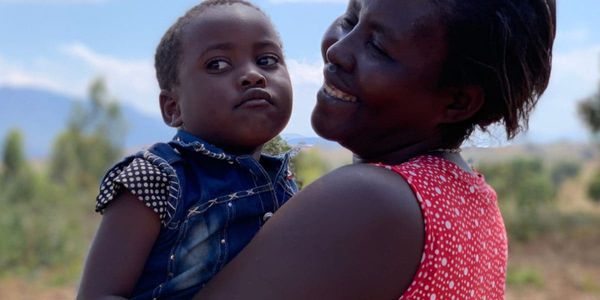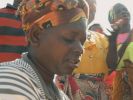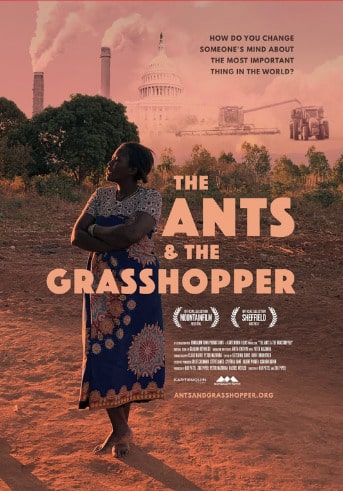Eye For Film >> Movies >> The Ants And The Grasshopper (2021) Film Review
The Ants And The Grasshopper
Reviewed by: Jennie Kermode

In case you’re not familiar with the story of the ants and the grasshopper, it goes like this. Ants are hard working, industrious creatures. In the winter, they work. In the summer, they work. This means that although there is less food available in winter, they have enough to live on all year round. by contrast, the grasshopper spends the summer playing and enjoying the sun. In the winter he has nothing. He turns to the ants, telling them that the summer was so lovely that he couldn’t help but waste his time. The ants agree to feed him, but warn him that if he doesn’t learn to to work in summer, there will come a time when he starves.
Raj Patel and Zak Piper’s documentary begins in Bwabwa, Malawi, where the bed of the Rukuru River is cracked and dry. Only in one place can water be extracted from a hole, and after one person has filled a bucket, the next has to wait for the water in it to rise up again.

“These days it feels as if both time and rain are running out,” says local farmer Anita Chitaya. She used to think that God had cursed her village. Then she learned about climate change.
Anita and her husband Christopher have one acre of land on which they grow corn, beans, cassava and pumpkins and pigeon peas – plants which work together for healthy soil. Scraps go to the pigs. Her son France gazes at aeroplanes overhead and says he wants to be a pilot, but she warns him about the harm that flying is doing to the environment. The people in the village have tried to do their bit, inventing a new type of clay stove which enables them to cook with less wood and more that halves their carbon emissions, but of course it’s not enough – not whilst people on the other side of the world are carrying on as if there’s no problem at all.
Though Anita’s situation may be extreme, people all around the world will relate to this feeling of hopelessness. Often it’s the poorest people, living at the sharp end of climate change impacts on prices , as well as their immediate environments, who have the clearest understanding of what needs to be done, but are least able to influence the behaviour of those making the biggest contributions to the problem. Like many of them, Anita finds a way forward through politics, joining a group called Soil, Food and Healthy Communities which was started by a local nurse, Esther.
Using discussion groups and drama, Esther aims to make people aware of practices which are holding them back. This is a place where, until very recently, the abduction of women into marriage has been seen as ordinary and not altogether unreasonable. Now Esther is persuading the men to treat women with respect, even when it comes to pulling their weight with day to day labour. The group learns organic farming techniques which will help them to make the most of the resources they still have.
Everywhere, there are holdouts. “Water, washing plates and powdering maize are the duties of women,” says local man Winston, worried about what his friends will think if they see him doing something like that. Esther and Anita work to win him over. Then, through the filmmakers, comes an opportunity. If they can get through to people like him, might they be able to get through to Americans who still refuse to accept that climate change is real?
The second half of the film follows the women on a journey which is partly about teaching and partly about discovery. They spend only a brief time dealing with politicians, with most showing no interest in them. “I heard that the President doesn’t like Black people and I am afraid that everyone else will have the same heart,” says Anita, but they have better luck with farmers like themselves. It’s easy to bond over a shared fondness for animals and an interest in different crops with interesting ways of resisting drought, replenishing the soil or providing shade for more delicate species. It’s enjoyable to watch this edifying connection between people discovering how much they have in common.
This film is also important because, in a very simple and straightforward way, it illustrates what poor Black women can teach to much more prosperous white people from a country with far greater advantages. The women are shocked by the ignorance they encounter in some places, but even there, they are warmly received, and they are fluent in the language needed to challenge the idea that the changing climate is God’s will and human actions don’t matter, as well as in the scientific language needed to distinguish between climate and mere weather.
Perhaps the film’s most joyous moment comes in Iowa, where they encounter a member of a group much like their own, the Women, Food and Agriculture network. There is delighted laughter when she introduces them to the word ‘mansplaining’, and it’s the start of a realisation that there are Americans who are also trying to turn things around through organic farming and education. It’s notable that these are mostly women and people of colour – the latter group, as they note, being most heavily represented in the ten cities which they encounter after having been dazzled by bridges and skyscrapers. Again, the most vulnerable people have the clearest understanding of what’s wrong.
Back home in Bwabwa, Winston’s young daughter is worried about a recently hatched chick with an injured leg. He tells her that it will die. Why don’t people die when they have injured legs? she asks, and he explains that it’s because people look after each other. It’s one of a number of small, perfectly observed moments which distil the film’s message. The child won’t give up on the little chick. She continues to hope.
Reviewed on: 28 Mar 2023















